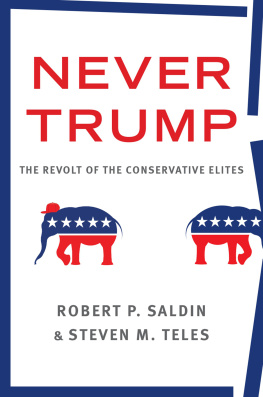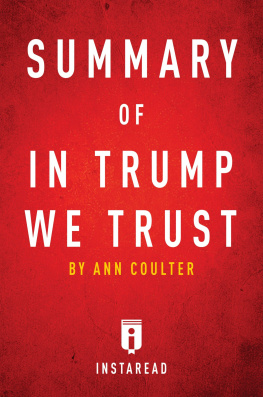Robert P. Saldin - Never Trump: The Revolt of the Conservative Elites
Here you can read online Robert P. Saldin - Never Trump: The Revolt of the Conservative Elites full text of the book (entire story) in english for free. Download pdf and epub, get meaning, cover and reviews about this ebook. year: 2020, publisher: Oxford University Press, genre: Politics. Description of the work, (preface) as well as reviews are available. Best literature library LitArk.com created for fans of good reading and offers a wide selection of genres:
Romance novel
Science fiction
Adventure
Detective
Science
History
Home and family
Prose
Art
Politics
Computer
Non-fiction
Religion
Business
Children
Humor
Choose a favorite category and find really read worthwhile books. Enjoy immersion in the world of imagination, feel the emotions of the characters or learn something new for yourself, make an fascinating discovery.
- Book:Never Trump: The Revolt of the Conservative Elites
- Author:
- Publisher:Oxford University Press
- Genre:
- Year:2020
- Rating:4 / 5
- Favourites:Add to favourites
- Your mark:
- 80
- 1
- 2
- 3
- 4
- 5
Never Trump: The Revolt of the Conservative Elites: summary, description and annotation
We offer to read an annotation, description, summary or preface (depends on what the author of the book "Never Trump: The Revolt of the Conservative Elites" wrote himself). If you haven't found the necessary information about the book — write in the comments, we will try to find it.
Never Trump: The Revolt of the Conservative Elites — read online for free the complete book (whole text) full work
Below is the text of the book, divided by pages. System saving the place of the last page read, allows you to conveniently read the book "Never Trump: The Revolt of the Conservative Elites" online for free, without having to search again every time where you left off. Put a bookmark, and you can go to the page where you finished reading at any time.
Font size:
Interval:
Bookmark:



Oxford University Press is a department of the University of Oxford. It furthers the Universitys objective of excellence in research, scholarship, and education by publishing worldwide. Oxford is a registered trade mark of Oxford University Press in the UK and certain other countries.
Published in the United States of America by Oxford University Press
198 Madison Avenue, New York, NY 10016, United States of America.
Oxford University Press 2020
All rights reserved. No part of this publication may be reproduced, stored in a retrieval system, or transmitted, in any form or by any means, without the prior permission in writing of Oxford University Press, or as expressly permitted by law, by license, or under terms agreed with the appropriate reproduction rights organization. Inquiries concerning reproduction outside the scope of the above should be sent to the Rights Department, Oxford University Press, at the address above.
You must not circulate this work in any other form and you must impose this same condition on any acquirer.
Library of Congress Cataloging-in-Publication Data
Names: Saldin, Robert P., 1977 author. | Teles, Steven Michael, author.
Title: Never Trump : the revolt of the conservative elites /
Robert P. Saldin and Steven M. Teles.
Description: New York, NY : Oxford University Press, 2020. |
Includes bibliographical references and index.
Identifiers: LCCN 2019054913 (print) | LCCN 2019054914 (ebook) |
ISBN 9780190880446 (hardback) | ISBN 9780190880460 (epub) |
ISBN 9780190933173
Subjects: LCSH: Republican Party (U.S. : 1854) |
Intra-party disagreements (Political parties)United States. | ConservatismUnited States. |
PresidentsUnited StatesElection, 2016. | Trump, Donald, 1946 |
United StatesPolitics and government2017
Classification: LCC JK2356 .S277 2020 (print) | LCC JK2356 (ebook) |
DDC 324.973/0932dc23
LC record available at https://lccn.loc.gov/2019054913
LC ebook record available at https://lccn.loc.gov/2019054914


We would like to thank the Hewlett Foundation, and especially its president Larry Kramer, for generous and timely financial support. We also received helpful feedback from a number of friends and colleagues: Melissa Bass, Dan DiSalvo, Dan Drezner, Heather Hurlburt, Geoffrey Kabaservice, David Karol, David Mayhew, Larry Mead, Patrick Ruffini, Reihan Salam, Danny Schlozman, Adam Sheingate, Jerry Taylor, and several anonymous reviewers arranged by Oxford University Press. This book never would have been possible without our interviewees, and we are grateful to them for sharing so openly and frankly their experiences and insights of what has been, for many, an unsettlingeven traumaticperiod in their lives. We are also indebted to Dave McBride and his team at OUP. Rob wishes to thank his family for their love, support, and patience, especially Erin, Sylvie, Frankie, and his parents. Steve would like to recognize the students in his spring 2019 Political Polarization class at Johns Hopkins, who helped him think through how the nation got in this mess, and all his friends and comrades at the Niskanen Center. Lastly, Steve thanks his wife, Fawzia, whose pessimism about the prospects of her adopted country under Trump has pushed him to think harder about how it might get better.

panic had already set in by the time #nevertrump became a viral sensation on Twitter. For over seven months, Republican elites had dismissed Donald Trump as a buffoonish, unserious candidate, reassuring themselves that he was destined to be laughed off the Republican stage. If his opera buffa-esque campaign kickoff eventhighlighted by his assertion that Mexican immigrants are rapistswouldnt do it, certainly his ridiculous policies like having Mexico pay for a border wall would. There was no way, they insisted, that Trump could survive his vulgar allegation that Fox News personality and debate moderator Megyn Kellys tough line of questioning was the result of her menstrual cycle. At the very least, they were confident that Republican voters would instinctively recoil from his cruelty, so plainly on display in episodes like his mockery of party icon John McCains POW status, his attack on primary opponent Carly Fiorinas appearance, and his imitation of a disabled reporter. And what about his childish rhetoric characterized by schoolyard insults and his reliance on simple, low-syllable-count words like stupid? Or those garish hats brandishing his provincial slogan, Make America Great Again? Admittedly, they counseled themselves, Republican primary voters sometimes flirt with outsider candidates, but they always eventually settle down with a clean, respectable suitor.
Yet, by late February it was clear to all but the most delusional observers that Trump was well on his way to securing the Republican presidential nomination. Not only had he decisively won the key early-cycle states of New Hampshire, South Carolina, and Nevada, hed also just picked up the one thing that had eluded him thus far: endorsements from establishment Republicans in the form of a vanquished primary opponent (New Jersey Governor Chris Christie) and a US Senator (Alabamas Jeff Sessions). Republican primary voters were flocking to Trumps revolution, and the party elites fortifications were crumbling. It was only at this point that the #nevertrump hashtag blew up. Like any meme, #nevertrump had a variety of meanings to those who deployed it. But for the elite Republicans and conservatives who embraced it, #nevertrump signaled horror and incomprehension at the rise of Donald Trump and how it had turned their political world upside down. #Nevertrump was also a way of signaling that Trump represented something more sinister than normal quadrennial Republican and conservative movement primary politics.
Once they recognized the threat, the strongest adherents to Never Trump relentlessly and desperately searched for ways to frustrate Trumps takeover of the Republican Party. They organized letters in which a range of the partys top experts and former Republican luminaries declared their opposition to him. They tried and failed to coalesce behind a single primary challenger, and then schemed to deny Trump the partys nomination at the Republican National Convention. They searched for and eventually found a third-party candidate in the hopes that they could deadlock the Electoral College and throw the election to the House of Representatives. Shocking even themselves, a number of these lifelong Republicans, who had spent their careers battling Democrats, ended up voting for someone other than their partys nominee, up to and including their former nemesis, Hillary Clinton. Even after his election, a remnant of these Never Trumpers have kept up rear-guard efforts to expose the perfidy of the Trump administration and to call their former allies away from the siren song of Trumpian populism.
It is hard not to look at these efforts, at least as of the spring of 2020, as having comprehensively failed. Donald Trump is as popular with Republican voters as any president in the modern era. The partys core coalition partnersfrom the National Rifle Association (NRA) to pro-lifershave, with various degrees of enthusiasm, stuck by him. The ranks of Never Trump, meanwhile, have seen considerable attrition, with some of their foot soldiers slinking into the Trumpian fold while others defected to the Democrats or simply resigned themselves to being politically homeless. Nonetheless, a dedicated contingent have sought to keep the candle burning, hoping for a turn of fortune. They may yet provide, like St. Benedict in the catacombs, the foundation for an eventual return to the true church. All indications, however, point to a long struggle.
Font size:
Interval:
Bookmark:
Similar books «Never Trump: The Revolt of the Conservative Elites»
Look at similar books to Never Trump: The Revolt of the Conservative Elites. We have selected literature similar in name and meaning in the hope of providing readers with more options to find new, interesting, not yet read works.
Discussion, reviews of the book Never Trump: The Revolt of the Conservative Elites and just readers' own opinions. Leave your comments, write what you think about the work, its meaning or the main characters. Specify what exactly you liked and what you didn't like, and why you think so.







